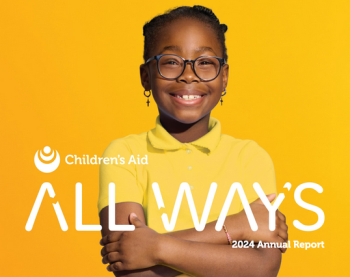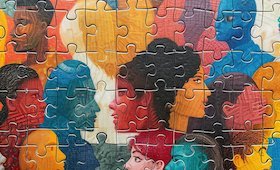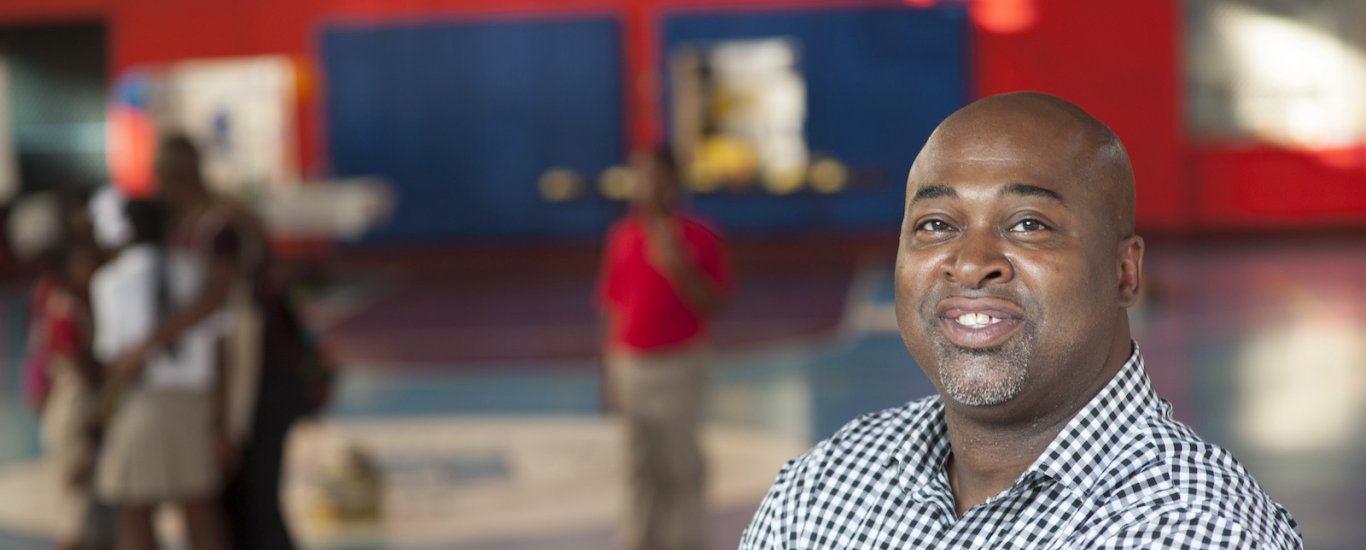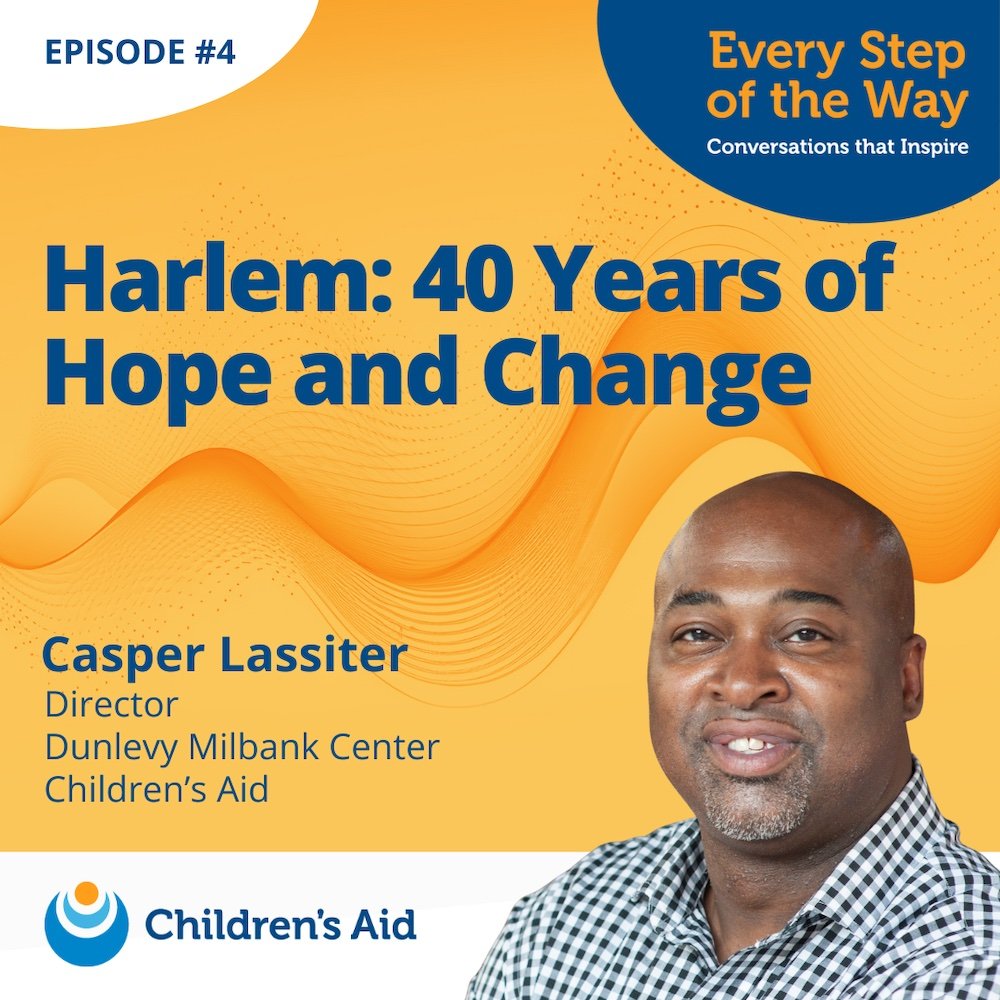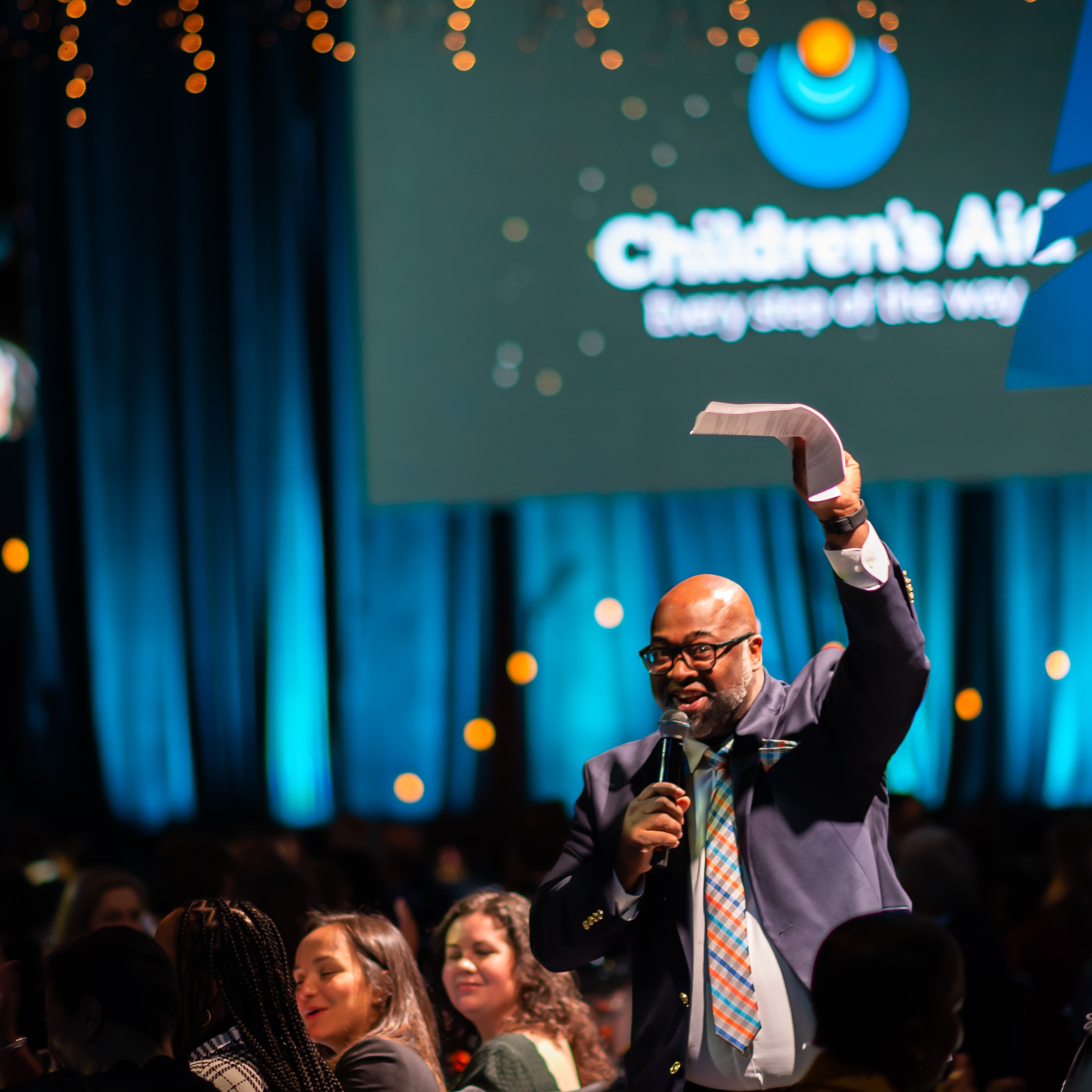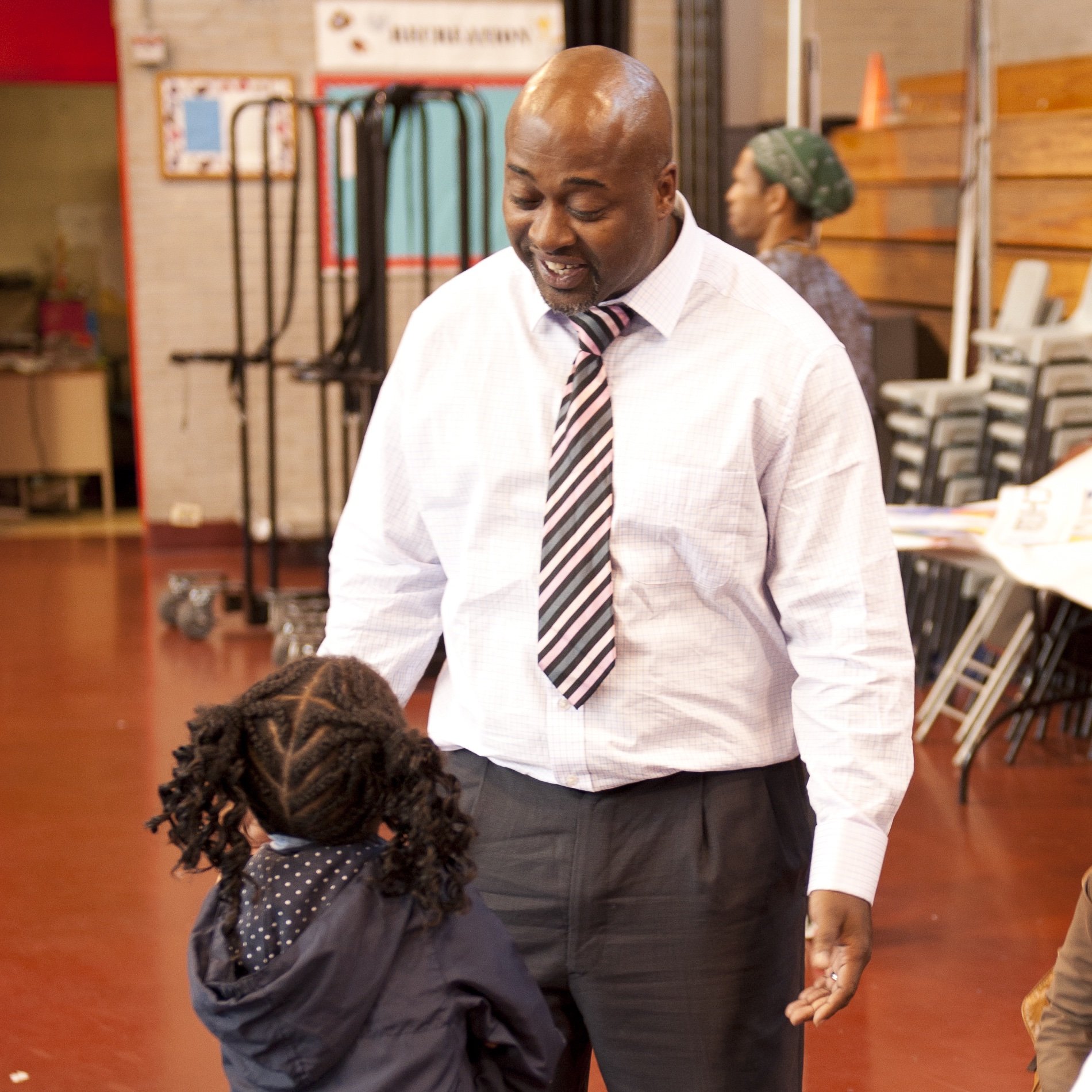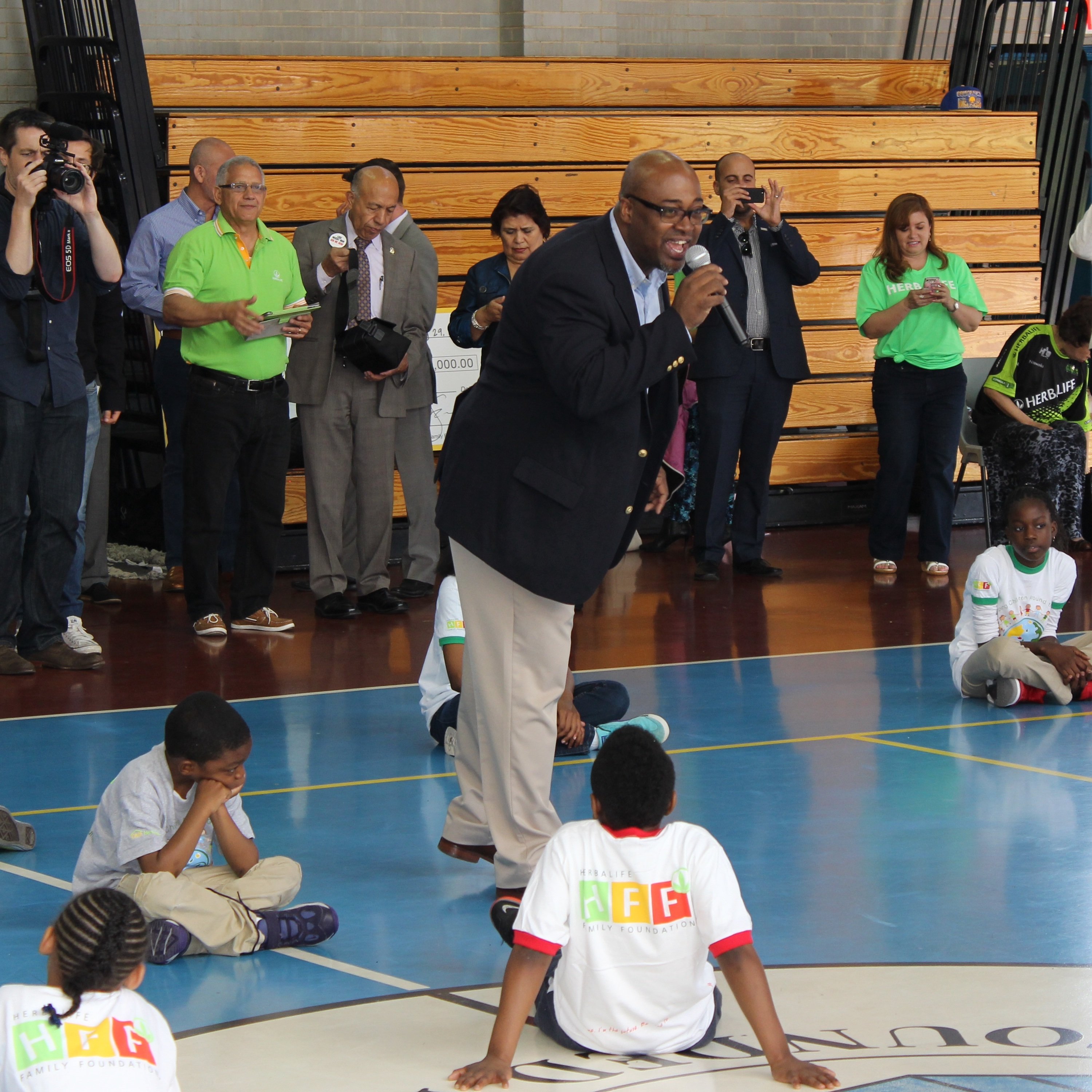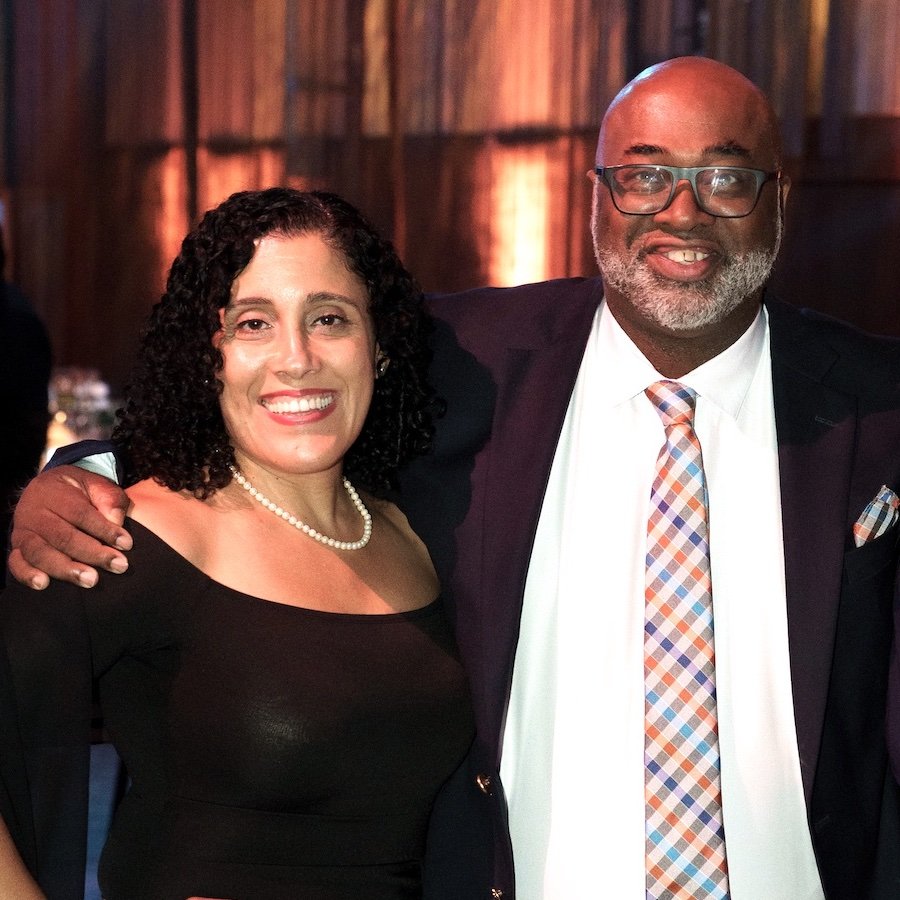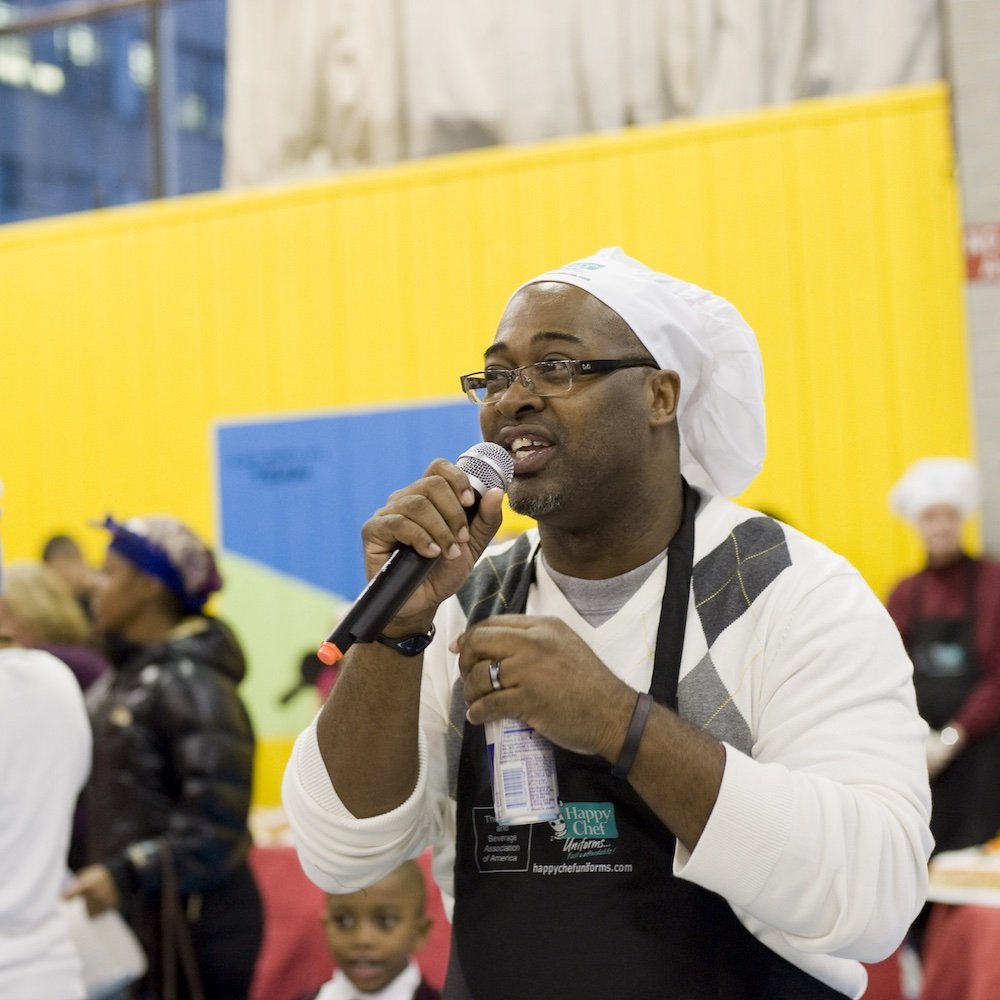[00:00:00] Georgia Boothe: Hi everyone, and welcome to another episode of Every Step of the Way. Today, I am here with my colleague Sandra Escamilla, and we are going to be speaking with our director from our Milbank Center, Casper Lassiter. Are you excited, Sandra, that we're gonna be talking with Casper today?
Sandra: Most definitely. I mean,Georgia, Casper has been here for over four decades. He has a wealth of knowledge, and he is the epitome of positive youth development. I can't wait to hear just his journey at Children's Aid and for him to share some of the impact that he's had on the children, youth, and families in Harlem.
Georgia Boothe: Awesome. I can't wait to hear what he has to say, too. Casper is such a rock star at Children's Aid and has such a tremendous impact on so many young people over the years. I'm just looking forward to his insights.
Sandra Escamilla: Welcome Casper. How you doing today?
Casper Lassiter: [00:01:00] I'm doing well. Very excited to be in the chair and tell my story on the Children's Aid Podcast. This is gonna be fun.
Sandra Escamilla: Great. And before we get into kind of your experience at Children's Aid, which you've spent most of your life here, most of your young adult and adult life here. I want you to tell us a little bit about your background before you got involved with Children's Aid.
What was your life like before you got to Children's Aid?
Casper Lassiter: Well, to be honest, I didn't have a lot of structure so to speak. So actually, my life changed at nine years old when my mom decided to let me stay with my grandmother who actually lived in the high rise right next to Milbank.
So that was really my invitation to Milbank. So, if I didn't get the opportunity to kind of leave that environment and come over to a more structured environment with my grandmother. I probably would've never walked into Milbank doors. So it was a blessing and once she signed me up, I was hooked.
Sandra Escamilla: You live right in the apartments next to Millbank?
Casper Lassiter: Yeah, I grew up right next door.
Sandra Escamilla: Oh, I didn't know that. That's fantastic.
Casper Lassiter: Yeah, [00:02:00] that big building on the corner, that's where I grew up.
Sandra Escamilla: And just for the folks who are here, , what street is that?
Casper Lassiter: That's 118th, Eight West, 118th. We call the building Eight West.
Georgia Boothe: So, Casper, can you tell us a little bit about how you got involved with Children's Aid and your journey with us to date?
Casper Lassiter: Sure. So, I guess it all started like I said, when I moved over to a 118th street from 113th street to my grandmother's house I was right next door to Millbank, saw kids going in, and I decided to try it myself and try out for the basketball team.
That was my first entry point, was trying out for the basketball team at nine years old. And once I became a part of the team, I was introduced to everything that, Children's Aid offered back then, which was mainly afterschool programming. So I got involved in that and as I got older, you know, that's really when my life began to shape because you know, Dr. Michael Carrera introduced his family life and sex ed program at [00:03:00] Milbank and East Harlem in the mid eighties. And I was a part of the first generation of that program and that's where kind of, I guess my career path took off when I was introduced to, to so many things outside of the neighborhood 'cause you gotta remember what was going on on 118th in 1986.
Millbank was the brightest spot on the block. I mean, it was the middle of the crack era, you know, so it was a lot of things going on, within the block with, you know, my family, the community. So Milbank kind of was my safe space because it was nothing but positivity inside the building.
Positive role models, resources that I had access to. So it was a really a blessing for me to be involved and Doc taught us so much about our self, how to be resilient and how to get off the block, which I think was very, very important. We're introduced to college by working at Hunter College.
We were introduced to different sports by playing squash in [00:04:00] Midtown. It was just so many opportunities that I didn't realize were there until, you know, I was part of Dr. Carrera's program and I'm always grateful to Doc for kind of you know, showing me the light, that there was possibilities beyond on 118th street.
And that's something that I probably kept with me as I moved in my service journey was giving young people the opportunity and, and showing them there are resources beyond their blocks.
Sandra Escamilla: Can you say a little more about that point of tension? Because it was the eighties, right? Which Georgia and I are also very familiar. We're the same generation.
So here you are going to Millbank and you're getting all of these resources, but you're also getting pressure right from the streets.
Casper Lassiter: Of course.
Sandra Escamilla: Tell me what was it about Millbank? I mean, I heard specifically, I mean I heard generally some of the kind of opportunities, but what was it that was much more attractive to you than, you know a lot of folks our age decided that the street had a larger purpose or calling. Right. So can you talk about that a little bit?
Casper Lassiter: And [00:05:00] this is something that I think has always happened to me, is that adults around me always guided me. They always saw something in me and they kind of protected me.
I remember Mr. Lou from Milbank gave me my first job. Out of all the young people that were playing in the basketball program on the weekends he chose me to sell hot dogs with him on the weekends during the game, right? Doc chose me to go to Hunter College to work while everyone else worked in Milbank, selling hot dogs.
I got the opportunity to go to Hunter College to work for two years, so I, I don't know if it was the energy or what have you, I just was always in the right place in the right time, and, folks just took a liking to me and saw that I had potential. I didn't realize that I had potential because when I left Milbank, you know, I had friends that were doing things.
But I was in sports, I was in basketball, so I was kind of, I was kind of protected, so to speak. I was good at basketball, so the older cats kind of looked out for [00:06:00] me, you know, and I always appreciated that, that, you know, when things were going left, they would pull me to the side and say, right, Cas.
You go off the block or you go in the house or go back into to Millbank. So I kind of had that, that village piece, not only from the adults but some of the older cats in the neighborhood they kind of protected me and, and looked out for me and you know, and I'm always grateful to my Harlem community for that.
And I tell these guys to this day because I still see some of them. Some of 'em still come around and I thank them all the time for looking out for me, and that's another thing that I try to tell young people, if I'm on you, if I'm in your ear all the time, that means that I care.
The day I stop doing that is when you need to worry. So, it was like a really a community effort just seeing that I have potential, that I may have the opportunity to get out and just, folks just helped me along the way and, and I'm always gonna be appreciative of that.
Sandra Escamilla: I love that. Did you ever imagine while you were there, nine years old [00:07:00] until fast forward, you know, present. Any point in your earlier journey? Did you ever imagine that you would be the director of Milbank?
Because that's wild, right?
Casper Lassiter: But I'm gonna tell you a story. The summer of, I believe summer of 90 my senior year, I had a falling out with my basketball coach at the time.
I guess I had hit my plateau or whatever I had, you know, reached the level I was gonna reach basketball wise, but I was already going to college, I was already on that path, so I was good. So we had a big falling out or whatever, and I remember saying, you know what?
I don't care if I ever play basketball again. I'm on my way to college. I'm gonna graduate and I'm gonna come back and I'm gonna take your job. I remember saying that in front of Milbank. I'll never forget that, that was my line. I said, you know what, I'm gonna go to college. You know what? I'm gonna come back and I'm gonna take your job.
And I, maybe it was in my subconscious because every summer I came home, I had the opportunity to work in the youth development service [00:08:00] program. That's what we called the team program back then. And I worked for two years at JP Morgan Chase. And then that third summer I worked at Milbank as a counselor, and that's what shaped me, why I felt that I needed to be in my community.
Right? I felt the corporate life for two years. It was good. Money was great. Nice lunches, ate at the cafeteria. JP Morgan was nice, but it was something about working with the young people in my community that gave me a push and said, you know what? This is probably where I need to be. And then as I studied in college, I studied social psych in college and it was kind of bringing back, you know, I understood the why of the behavior of some of, of myself, my peers, my family.
And it kind of connected to me that this is where, you know, I wanted to be.
Georgia Boothe: Casper, that is so awesome. I, I love hearing that you know, kind of your experience and how that's shaped where you are right now. Can you speak to like in [00:09:00] addition to kind of basketball and some of the other supports, how did the experience at Children's Aid at Milbank kind of solidify that yearning that you had to wanna be helpful to young people, to, wanna get into this career that you've embarked on?
Casper Lassiter: So I think the one summer that I worked with, we called them tweens, that was our middle school group. I just connected, you know, with them I was about maybe 18, 19. I wasn't too far away with them age wise, so I just connected with them and it was working with the folks, the young people that nobody else wanted to work with.
I just found that I had a connection with them. I could calm them down. I could make them laugh, and it just felt right for me to kind of do what folks did for me. Help guide, show them that they had an opportunity, show them a better way. So, I mean, I just was hooked on that. Once I learned that I can connect to young people. It [00:10:00] just fell into line , and like I said, I, once I combined it with what I was studying in school. And, it just worked out for me because I really got to understand the behavior of a lot of people that I grew up with, you know, and, and I understood why they had to do some of the things that they did, and I understood why some of the kids were behaving the way they were behaving.
I couldn't be judgmental anymore because I understood it and I wanted to fix it. I wanted to help it. I wanted to, to make it better. So it was just, just being there and just being successful with helping young people. It just felt really, really good.
Sandra: So, you know, we have an internal kind of, uh, understanding or joke about you, where we just say if nobody wants to do it, we give it to Casper.
Whether it be the most difficult program, the most under-resourced situation, and we're like, he's gonna work his magic.
And I hear what you're saying, that you understand the context, but you make a choice to always say yes. You say yes to everything. And I wanna get a sense of where that [00:11:00] that comes from. Because we have people that have been in the program for a long time and they're a little more tentative.
But you lean in, I've sent young people your way and staff your way that have not been successful in other places. What is it like, where'd you learn that?
Casper Lassiter: Probably, I think I get a lot of that from Doc. Just taking any opportunity to bring resources to Milbank to my young people.
I think that's what it is for me. I'll try something new because it's something different. You know, I, that's just me. I just always look for something different and to give my young people exposure, to give them an opportunity to find that one gift in a young person. When we brought the music program in, when I first moved over to Milbank, kids were thinking about music they all wanted to play ball. You know, kids like computers. But I said, listen, I'm bringing free music classes here. And I was able to connect young people who were not focused on anything, say, all right, try playing the drums. You know, kids learn how to play drums. It was things like that where you try unique [00:12:00] things that are a little bit different, you have an opportunity to help a young person find their gift. And that's really what it's all about for me. And in terms of staff, I just love developing people, man. My motto is, if you look good, I look good. So the more that I develop people and give them an opportunity.
You shine, we all shine. That's my motto. And I love seeing people, you know, start at Milbank and get a shot at their own site or their own program. It just makes me feel good. I sit back and just look and be like, yeah, I'll just be proud man. And I just love helping people and, and seeing people grow again.
Folks did that for me. I just want to pass it along. I know I'm not going to be here forever, but I would just wanna make sure that the legacy is in place and that folks knew that, that I always had their back when it was good, when it was bad, you know? 'cause it's not always been rosy and rocky.
For me there was definitely some challenges along the way where people didn't understand my style and didn't get it. But eventually they got it and they kind of understood the [00:13:00] culture that I developed at Milbank, and they decided to finally jump on a boat.
But there was those that couldn't understand it. And got off the boat. And that's fine with me because whatever decision that I make, it's always gonna be about the kids. It's kids first.
What's best for the young people, what's best for the families, and that's my motto and that's my philosophy.
And that's about leadership. You know, my leadership is based on the success of the team and how good they're doing.
Georgia Boothe: Yes. That's beautiful Casper. Reflecting on your time at Children's Aid, what advice would you give to young people coming up in the program? That's part one. And then part two, what advice would you give to our young staff that are thinking of getting on this career path?
Casper Lassiter: Right so to the young people, once your foot is in the door, I can honestly say, you are good. You know, the staff, the resources that we have at [00:14:00] Children's Aid, you're good. Listen to us, let us guide you. Let us help you get to the next level. You're not gonna find too many organizations with the resources and the connections that we have in Children's Aid
so take advantage of that. As I said before, if we're on you, listen. We're doing it for a reason. We're pushing you for a reason. We're going to protect you. We're going to advocate for you. We're always gonna have your best interests in mind, so let us do the work. Let us open that path so you can be successful. For the staff:
Be yourself. everyone has a unique gift, right? And don't be afraid to show it. If you have a path similar to the young people, don't be afraid to share it. You've broke down some walls, you know, let the young people know how you did it. We take those, those hits for the next generation.
You are not going to connect with every young person, and that's okay. And Sandra, you know, remember Angel? What he said right at, at the training [00:15:00] all of our kids, and that's the mentality that you have. If I can't do it, I know that my staff person, next to me is going to back me up. They may have the best relationship with that particular young person. Don't take that personal, it's going to take a team effort. You know, when we're working with young people, especially in this time in age, where they have so much information and they don't need to rely on us as much.
So we're adjusting how we approach working with young people. You know, back in the day when I was running team program, I opened a building at six o'clock, I got 60 to 70 teens. 30 here doing this, 20 here doing this, or just 10 just walking around the building. But they were in a safe space. Nowadays, we have to find how to connect to them in this digital age where they have access to everything.
So it's trying to make that adjustment as well. And I am relying on a younger staff to kind of help me out. Right, because I'm sitting there fumbling with things. Gen X, we're a little bit different. So I'm [00:16:00] relying on my young staff to lead the way. I mean, when we were working through Covid, it was a young staff that were coming up with all these creative ideas to do, you know, via Zoom with the young people.
And I loved it, you know, it was their opportunity to shine. So, that's my advice to the young staff. Be yourself, and teach us, you know, help us get there. We're a team. We're gonna utilize your new skillset. Help us help the young people and the families.
Sandra Escamilla: I mean, I love the learning stance that you always take. This idea that you can learn from anyone. And I do wanna add, you are a fellow social worker who really draws on a lot of the social work pedagogy and principles. And I was just wondering, right, given your role as someone who's come up right and learned in real time, some of those skills, and also from your perspective as a social worker, what are some of the things that you feel like the field is contending with right now, that's keeping you up at night, that you feel like we have to sharpen? You talked a little bit about just the generational [00:17:00] stance, but is there anything else that's bubbling up for you as like, we gotta figure out how to be on the forefront of this idea or solving this problem?
Casper Lassiter: Yeah, technology and, and social media. We have to figure that out, how to engage young people differently. what we're trying to do now is trying to bring in a lot of STEM programming and programming that they could utilize via social media, via the internet. Because the days of just them sitting in groups and us talking to 'em directly, it's kind of phasing out.
You are losing young people in a sense by just doing regular groups. So, we're trying to jazz it up a little bit and adding a little more technology to our lessons. More fun activities, more skill building activities to our program and to kind of, to meet the young people where they are.
And I think that's what's most important, that we probably have to, to make more of the adjustment and kind of catch up to what the young people are involved in. I think that's probably where we need to go to kind of meet them where they are [00:18:00] in this new technical world.
Georgia Boothe: So, Casper, knowing you, I know how much time and energy you invest in what you do. I know for you, this is not just a job, it's a mission, it's a purpose. It's your life's journey. We have lots of staff who are equally invested. First, how do you kind of get yourself centered and how do you take care of yourself?
Because, you know, we see lots of challenges with our young people and with our families. And what advice would you give our staff about self care. How to go about taking care of themselves while also giving so much to our clients?
Casper Lassiter: You know, I, focus on this a great deal in the beginning, every orientation. Just letting folks know that before you can do any work with the kids, before you can help anyone, you have to make sure that your stuff is in order, that you're in a great head space. [00:19:00] The kids will know your, your colleagues will know.
I will know, right? So, you know, we have that bridge before you walk into Milbank and I say, listen, leave your stuff over the bridge when you come in. For those three hours, let the kids be an inspiration to you. Let the kids be a motivation for you to be successful because we owe that to them. We're in this job to kind of help our young people become successful and they trust us.
You know, we build relationships with them. The families trust us. So, use them as a motivation. Cause it definitely helps me when I'm having a bad day. I'll just get up and go in the gym and just hear the Mr. Casper’s and the hugs. I'm good. For the rest of the day. So you just letting people know, just focus on yourself first so you can give your all for those three hours that you have per day.
And if you need to take a walk to get it together, that's okay. Right. If you need to come in my office and, and just have five minutes and, and just talk, [00:20:00] I'm here for that. It's okay. But our primary focus is making sure that our young people are engaged, they're safe, and they're having fun.
Georgia Boothe: That's awesome.
I think that's really good advice, Casper. I was talking to my team today about exactly that. When you go on the airplane as part of the safety measure, they always ask youto put your mask on first before you help anybody else.
And so, it's something we have to continue to remind our staff to do as they face all the challenges ahead of us.
Casper Lassiter: But I think it's important that I let folks know that, some folks see the job that we do, especially for you guys who are young, that is just an afterschool job that you're, you're just here watching kids.
I let everyone know how important you know their role is and you're helping shape someone life. You're creating last long memories. How many alumni come by and just say thank you. Right? These are folks that I were [00:21:00] working with 20 years ago that still have a connection to Milbank and the staff and the programs that help save their lives.
So just letting folks know that, you are very, very, very important when you, you're working with these young people, so just kind of take that into consideration with every move you make. They're watching you, they're listening to you, and like this is a lifelong relationship that you're creating with these kids and family.
So just keep that in consideration.
Sandra Escamilla: One of the things that I know you're known for is to be able to see people. And to make them feel like they're important. So, so thank you for that. 'Cause I think that's a special gift that you have. I want us to transition a little bit.
We're gonna do our rapid fire questions and you're not gonna overthink them. There's no right or wrong answer. So what's your favorite color?
Casper Lassiter: Blue.
Sandra Escamilla: What's your least favorite color?
Casper Lassiter: Red
Sandra Escamilla: What inspires you the most?
Casper Lassiter: Seeing seeing people that I touch do better, seeing people that I touch, grow, see people around me, grow and, and develop. I like [00:22:00] passing on and leaving legacies. That's, that's what motivates me and makes me feel good.
Sandra Escamilla: I love that.
What discourages you the most?
Casper Lassiter: What's discouraging me the most now is probably the state of our country. And with some of these policies that it'll effect, it'll have on the work that we do and the people we serve. You know, it's hard for me to kind of understand what's going on, but I know, in crisis, that's when agencies such as ours, step up to the plate to support and advocate for our family. So it's, that's just really discouraging to me that we have to put on an extra shield to protect our families with just unnecessary policies that I think that are gonna be totally unfair for our population.
Sandra Escamilla: Yes, now, what is the mantra or quote that you live by?
Casper Lassiter: A sign of a good leader is not how many followers you have. It's how many leaders you create.
Sandra Escamilla: Hmm. Yes. Yes. What sound or noise brings you [00:23:00] peace.
Casper Lassiter: Oh, I maybe I think I start using the ocean waves with my Alexa, so that helps me relax. I'm a Pisces, so I love water.
I don't like going to the beach, but I love water.
Sandra: I love that.
And what sound or noise do you find unsettling?
Casper Lassiter: Kids crying, especially when you're in this building.
You know, my radar goes off when I hear a scream or yell a kid crying. So I'll automatically go into protect mode. Even at home now that I'm raising a 3-year-old, I hear crying and my alert is, is up.
So yeah, it's like when you've been doing this for so long, that's kind of, one of the things that you look out for and you don't want to hear.
Sandra Escamilla: Yes. Now if I could snap my fingers and you would zoom into another career or job just for a day, what would that be?
Casper Lassiter: Oh, definitely. As an actor, yeah. I did like three plays in college.
I did like plays in middle school, in college. I was a theater double major social psych theater, so I would want to be an actor.
Sandra Escamilla: I love that. We gotta make it happen
Georgia Boothe: [00:24:00] exactly. It's not too late, Casper.
Casper Lassiter: I know I could play someone's uncle now.
Sandra Escamilla: Now tell me, what is a career or a role that you think, like you, you would be allergic to you, like you would say, I would never do that.
Casper Lassiter: I don't know. Maybe a politician.
Some people say I would be good at politics, but I don't think I could do it.
Sandra Escamilla: Unless you're acting.
Casper Lassiter: I couldn't stomach some of that stuff, so, no. Yeah. Yeah. I couldn't, I couldn't do politics.
Sandra Escamilla: I hear you. And then the final rapid, not so rapid question rounds. If you could share just one message with the world about the impact of Children's Aid, what would it be?
Casper Lassiter: Commitment. We have so many resources that could elevate you and take you to the next level, and that's from cradle to college. So, I am an example of that so I could preach that. And that's really the foundation of my work. Just using every resource that we have to, to combat on what's going on outside those doors, to, to help our young [00:25:00] people succeed and really support their families as well 'cause it's a really a team effort when we're working with our young people.
Sandra Escamilla: Casper, thank you so much for being with us today. It's been magical.
Georgia Boothe: You are so inspiring, Casper, just you being you. Much love my friend.
Casper Lassiter: I want to thank you two as well for taking the time outta your busy schedules to sit here with me and laugh and, and joke and, and talk and help us spread this beautiful message of, of Children's Aid. I really, really appreciate it. Thank you so much.
Sandra Escamilla: It's our pleasure, Casper.
Thank you.
Georgia Boothe: Thank you.
Sandra Escamilla: I feel like Casper's the poster child for Children's Aid, right? we talk about the impact of our work and I really do think we're in the seed planting industry and he has had the benefit of all of our services and look how beautiful he's blossomed and the water that he's given to other people.
Like, it's really extraordinary.
Georgia Boothe: It is. Listening to Casper speak, I get goosebumps like every [00:26:00] time. He's such a beautiful soul and so committed and so willing to go above and beyond. He is such an example of, to your point, Sandra, when we plant the right seeds and we nourish them, how they can grow and blossom into just amazing human beings.
And I'm so glad that he's at Children's Aid and he is taking everything he's learned and pouring into all the young people that are walking through the doors at Milbank. What an incredible gift to have him at Children's Aid.
Sandra Escamilla: Absolutely. And he really does walk in purpose. He sees this as his life's work.
And when you go to Milbank, you can feel that in the air. Like you could feel that people are committed to making a difference in the lives of each other. And that's why I feel like he's magic, and I think that, so is Milbank.
Georgia Boothe: Absolutely. It's such a special place. I walked into Milbank this morning [00:27:00] and just got greeted with so much love and, you can't help when you walk through that door to just feel so welcome and so secure when you're there because the staff under Casper's leadership, just makes you feel like, you know, they are the ray of sunshine on your face. It's just amazing to have that experience and I can't imagine for 12-year-olds, or 13-year-olds or seven-year-olds that are walking through the door to get programming. How myself as an adult, how I felt like I can only imagine for the younger kids how wonderful they must feel to have that outpouring of love and, just joy that they pour into everybody.
That's because of Casper and what he does and how he shows up and how he leads this team.
Sandra Escamilla: That's right. That's right.
Georgia Boothe: So I'll ask you a question, Sandra. What has it meant to you to have these conversations with folks like Casper?
Sandra Escamilla: [00:28:00] I've gotta tell you, it makes me really proud to be at Children's Aid. I've been here almost now, nine years. I'm approaching nine years, and it was after I had, you know, I've taken a hiatus in my career because I had a young child and I just wanted to be a consultant.
And the reason I came back into the world of work full-time was because the folks at Children's Aid made me want to kind of get on board and really begin to work towards the mission. And I am really happy that I made that choice and that I get to meet and work with folks like Casper every single day.
I mean, how lucky are we? Georgia?
Georgia Boothe: Unbelievably lucky. And like you, I'm so proud and just overjoyed to be here. I've had lots of jobs in my career. But I've not felt before like this is a place where I need to be and I need to be here because the folks that are here are just incredibly [00:29:00] committed.
They go above and beyond, like it's nothing. They advocate for themselves and the children and family in a way that just makes me so proud to be affiliated with Children's Aid and to be a leader here. It's just been, an incredible ride and I look forward to us continuing to have more of these conversations they have been inspiring to me and such incredible motivation.
Sandra Escamilla: Yes, same.
Georgia Boothe: Great. Thank you all for joining us and we look forward to seeing you on the next episode of “Every Step of the Way.”
